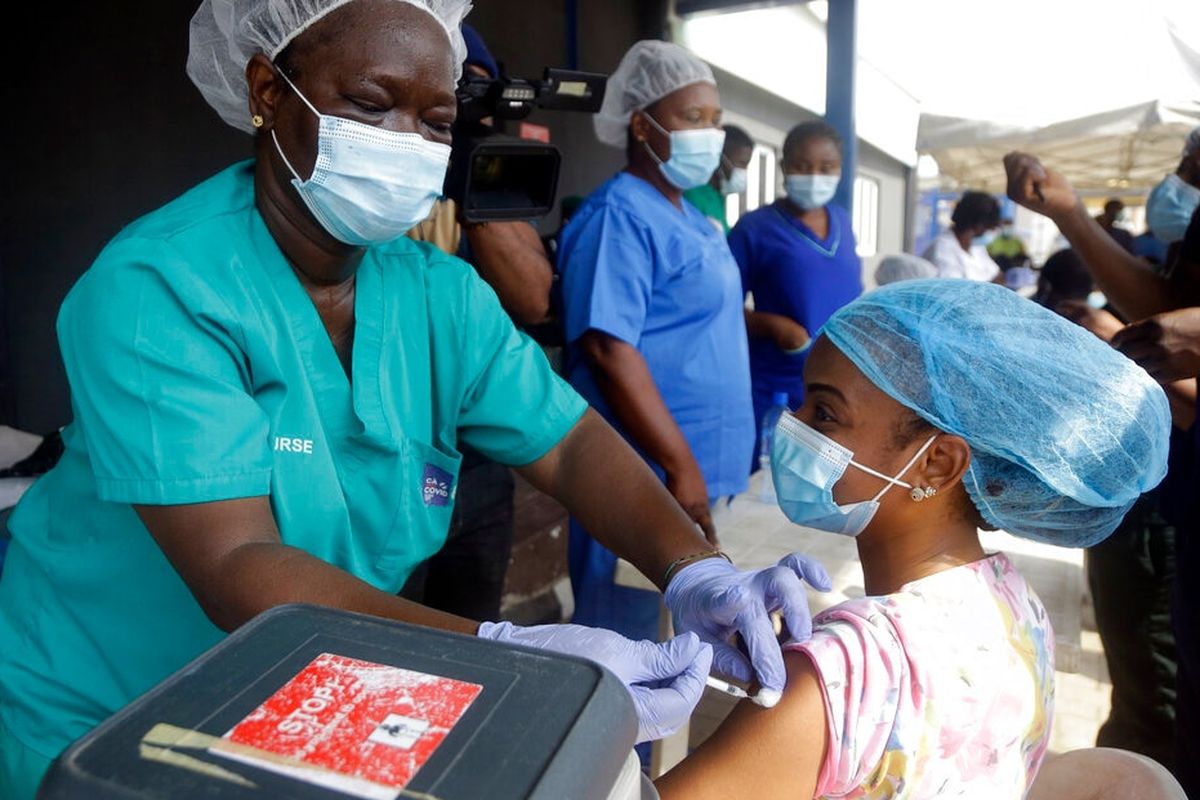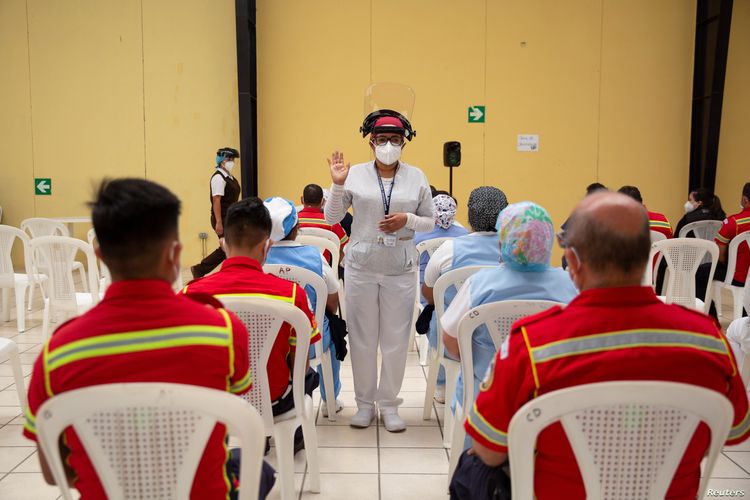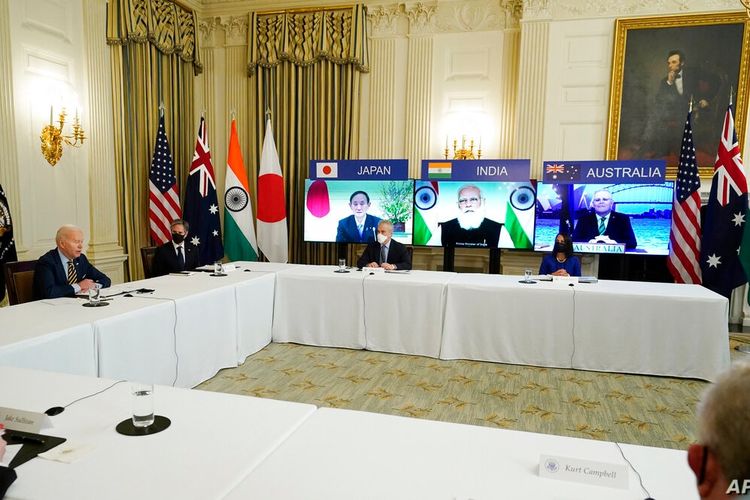
KOMPAS.com - The World Health Organization (WHO) on Friday approved Johnson & Johnson’s COVID-19 vaccine for emergency use, while also firmly endorsing AstraZeneca’s COVID-19 vaccine as some countries continued to suspend its use.
WHO spokeswoman Margaret Harris described AstraZeneca’s vaccine at a virtual briefing hosted in Geneva as “excellent” and said that “we should continue” to use the vaccine.
The WHO endorsement came as Thailand followed an increasing number of European countries in suspending AstraZeneca’s use because of periodic blood clots among recipients.
Bulgaria and the Democratic Republic of the Congo also suspended AstraZeneca use Friday. However, AstraZeneca said in response to the claims that there was “no evidence of an increased risk."
 Health workers and fireman sit under observation after receiving doses of the Oxford-AstraZeneca coronavirus vaccine, in Guatemala City, Guatemala, March 10, 2021
Health workers and fireman sit under observation after receiving doses of the Oxford-AstraZeneca coronavirus vaccine, in Guatemala City, Guatemala, March 10, 2021The European Medicines Agency, a European Union body that supervises medical products, said in a statement that the AstraZeneca vaccine’s “benefits continue to outweigh its risks and the vaccine can continue to be administered while investigation of cases of thromboembolic events is ongoing.”
Thromboembolic events occur when a blood clot breaks loose and travels through the body, causing harm.
The WHO had already approved the AstraZeneca vaccine for global emergency use and on Friday broadened global access to inoculations by approving Johnson & Johnson’s vaccine, the first to be administered in a single injection instead of two. The WHO also previously backed the vaccine by Pfizer-BioNTech, making for a total of three vaccine approvals.
“Every new, safe and effective tool against COVID-19 is another step closer to controlling the pandemic,” WHO Director-General Tedros Adhanom Ghebreyesus said in a statement.
In another development Friday, Brazil reported 2,216 COVID-19 deaths in the last 24 hours, the third day in a row that fatalities in the country exceeded 2,000. The stretch of deaths is the worst in Brazil since the pandemic began last year.
Brazil also reported 85,663 new cases of the coronavirus infection Friday, the second-highest number for a day.
Tedros described the situation in Brazil as “deeply concerning” and said that “unless serious measures are taken, the upward trend now flooding the health system and becoming more than its capacity will result in more deaths.”
 President Joe Biden speaks during a virtual meeting with Indian Prime Minister Narendra Modi, Australian Prime Minister Scott Morrison and Japanese Prime Minister Yoshihide Suga, from the State Dining Room of the White House, March 12, 2021.
President Joe Biden speaks during a virtual meeting with Indian Prime Minister Narendra Modi, Australian Prime Minister Scott Morrison and Japanese Prime Minister Yoshihide Suga, from the State Dining Room of the White House, March 12, 2021.Also Friday, the United States, Australia, India and Japan agreed to a partnership to make 1 billion vaccines available across Asia by the end of 2022, India’s foreign secretary said at a news conference in New Dehli after a virtual meeting with U.S. President Joe Biden and the leaders of the other countries.
At the virtual summit held by the four countries, the Quadrilateral Security Dialogue, commonly known as the “Quad,” the countries agreed to finance, manufacture and distribute the vaccine across Asia.
The initiative is designed to attack the global vaccine shortage and counter China’s growing diplomatic campaign to distribute vaccines in Southeast Asia and globally.
India, the world’s largest vaccine manufacturer, will use its capacity to make U.S. vaccines, which will be financed by the U.S. and Japan. Australia will provide financing, training and logistical support for vaccine distribution.
India reported more than 23,000 new COVID-19 cases Friday.
In Italy, most residents face new restrictions beginning Monday as the government tries to stop a rising number of cases.
Also read: Indonesia Receives 1 Million Doses of AstraZeneca's Covid-19 Vaccine
The restrictions include the closure of schools and nonessential shops in more than half of the country, including the capital, Rome, and the financial center, Milan.
Greek officials said they would extend COVID-19 restrictions in Athens to March 22, rather than March 16 as previously planned. Schools and nonessential shops have been closed in the city, along with other "red zone" areas, since last month.
In France, the number of confirmed COVID-19 cases rose above 4 million on Friday as the health ministry reported more than 25,000 new infections.
In the United States, deaths from COVID-19 have fallen in the last week to about 1,400 per day. That is down from the 2,000 daily deaths in recent weeks and the January peak of about 4,500 deaths per day.
A new poll by Reuters/Ipsos, a global company conducting surveys and research, showed that a majority of Americans supported workplace and travel restrictions for those who are not vaccinated against COVID-19.
Also read: Indonesia Issues Emergency Use Authorization to AstraZeneca's Covid-19 Vaccine
The poll found that 62% of Americans believed unvaccinated people should not be allowed to travel on airplanes, while 60% of Americans said they wanted to work for an employer “who requires everyone to get a coronavirus vaccine before returning to the office.”
Another poll released Friday, this one from The Associated Press-NORC Center for Public Affairs Research, a research organization and news agency partnership, found that Black and Hispanic Americans were more likely than white Americans to have experienced a loss of income due to the coronavirus pandemic.
Overall, 62% of Hispanic Americans and 54% of Black Americans have lost some form of household income during the pandemic, including job losses, pay cuts, cuts in hours and unpaid leave, compared with 45% of white Americans, the poll found.
The Johns Hopkins Coronavirus Resource Center reported 119 million global COVID-19 cases Friday. The United States, with 29.3 million infections, had more cases than anywhere else in the world. Brazil was next with 11.36 million, and India was third with 11.31 million.
Simak breaking news dan berita pilihan kami langsung di ponselmu. Pilih saluran andalanmu akses berita Kompas.com WhatsApp Channel : https://www.whatsapp.com/channel/0029VaFPbedBPzjZrk13HO3D. Pastikan kamu sudah install aplikasi WhatsApp ya.































